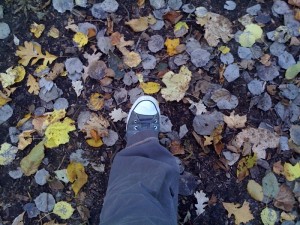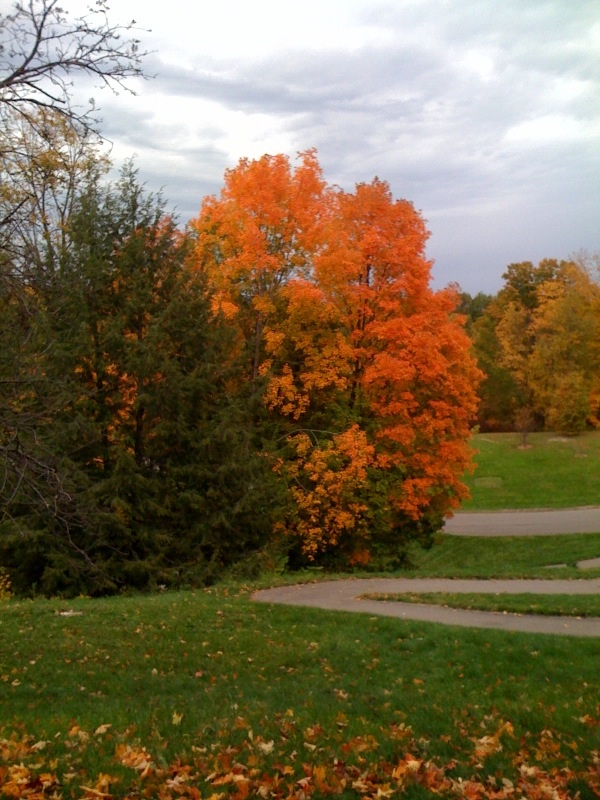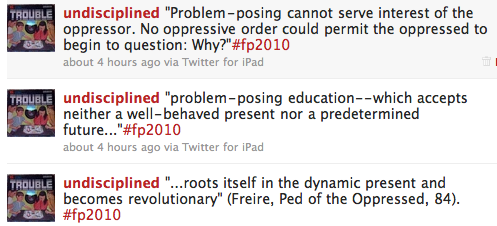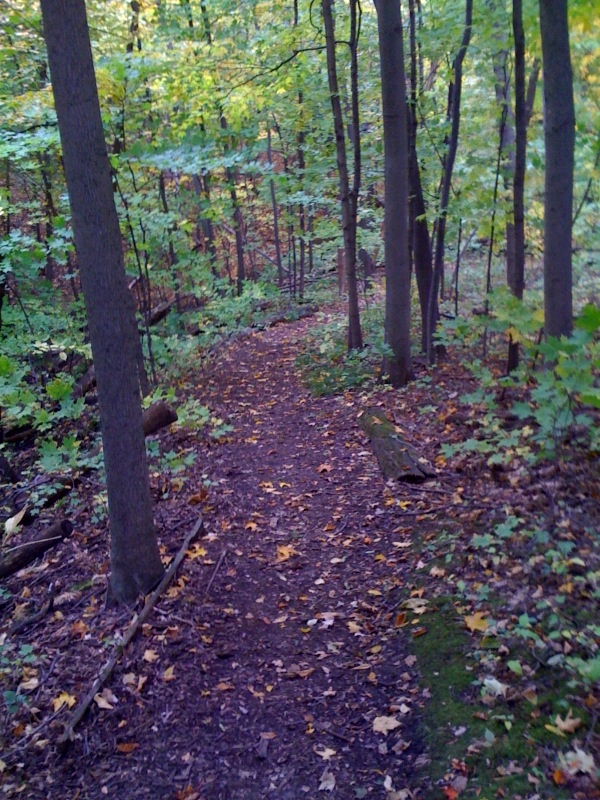This week in both of my classes, we are discussing pedagogy. In queering desire, we are talking about/engaging with/trying to practice some forms of queer pedagogy. In feminist pedagogy, we are focusing our attention on critical pedagogy. Not surprisingly, a central theme in both classes is the value of making and staying in trouble in relation to asking questions (a theme which has come up a lot on this blog). As I write this, I am in the midst of reading an excerpt from Paulo Freire’s Learning to Question. He writes:
the point of the question is not to turn the question “what does it mean to ask questions?” into an intellectual game, but to experience the force of the question, experience the challenge it offers, experience curiosity, and demonstrate it to the students. The problem which the teacher is really faced with is how in practice progressively to create with the students the habit, the virtue, of asking questions, of being surprised (37).
Excellent. Creating troublemaking habits are an important part of my own ethics of troublemaking. And, as I have suggested elsewhere, asking questions and being curious are central for my own pedagogical aims. How do we (as critical/feminist) educators develop those habits? Hmm…a topic for an article, perhaps?
So many ideas from this week’s class are swimming around in my head. I just wish I had time to respond to all of them and to organize them into some coherent statement. Since I don’t have time for that (and I don’t really want to…I’m writing this at the Minnesota Landscape Arboretum and want to go take a hike), I will offer up fragments from discussions in my classes (on blog and twitter) from this week.
As an aside: Have I discussed how difficult it can be to manage and maintain four different blog projects at once. It’s hard to post on all of them. I need to experiment with ways for them to work together. Maybe this entry is such an experiment?
So, here’s an overview of what I discussed on my other blogs.
Day Eight: October 5: In our discussion of queering pedagogy, I talked a lot about making and staying in trouble in the classroom. I connected this to Suzanne Luhman’s “Queering/Querying Pedagogy.” Here’s what I posted about it:
One version of queering pedagogy: Making and Staying in Trouble
…trouble is inevitable and the task, how best to make it, what best way to be in it (Butler, Gender Trouble).
troubling, spoiling, undermining, disrupting, destabilizing, unveiling, exposing, unsettling, subverting, resisting, twisting, critically questioning, deconstructing, opening up
uncertain, unpredictable, abnormal, fluid, unstable, confusing, flexible…
A few passages from Luhmann:
If subversiveness is not a new form of knowledge but lies in the capacity to raise questions about the detours of coming to know and making sense, then what does this mean for a pedagogy that imagines itself as queer? Can a queer pedagogy resist the desire for authority and stable knowledge; can it resist disseminating new knowledge and new forms of subjection? What if a queer pedagogy puts into crisis what is known and how we come to know (Luhmann, 5)?
Instead of focusing on the common concerns of teaching, such as what should be learned and how to teach this knowledge, pedagogy might begin with the question of how we come to know and how knowledge is produced in the interaction between teacher/text and student (Luhmann, 6).
As an alternative to the worry over strategies for effective knowledge transmission that reduce knowledge to mere information and students to rational but passive beings untroubled by the material studied, pedagogy might be posed as a question (as opposed to the answer) of knowledge: What does being taught, what does knowledge do to students (Luhmann, 7)?
Alice Pitt (1995) points out: “Learning about content is not the same thing as learning from it. In other words . . . learning is something more than a series of encounters with knowledge; learning entails, rather, the messier and less predictable process of becoming implicated in knowledge” [p. 298](Luhmann, 8).
Both queer theory and pedagogy argue that the process of making (sense) of selves relies on binaries such as homo-hetero, ignorance-knowledge, learner- teacher, reader-writer, and so on. Queer theory and pedagogy place at stake the desire to deconstruct binaries central to Western modes of meaning making, learning, teaching, and doing politics. Both desire to subvert the processes of normalization (Luhmann, 8).at stake are the implications of queer theory and pedagogy for the messy processes of learning and teaching, reading and writing. Instead of posing (the right) knowledge as answer or solution, queer theory and the pedagogy I have outlined here pose knowledge as an interminable question (Luhmann, 9).
Such queer pedagogy does not hold the promise of a successful remedy against homophobia, nor is it a cure for the lack of self-esteem. This pedagogy is not (just) about a different curriculum or new methods of instruction. It is an inquiry into the conditions that make learning possible or prevent learning. It suggests a conversation about what I can bear to know and what I refuse when I refuse certain identifications. What is at stake in this pedagogy is the deeply social or dialogic situation of subject formation, the processes of how we make ourselves through and against others. As an inquiry into those processes, my queer pedagogy is not very heroic. It does not position itself as a bulwark against oppression, it does not claim the high grounds of subversion but hopefully it encourages an ethical practice by studying the risks of normalization, the limits of its own practices, and the im/possibilities of (subversive) teaching and learning.
In connection with this discussion, I also posted an open thread on class discussion. I focused on discomfort, uncertainty, resistance and failure. Incidentally, this open thread is the second one I have done this semester. It hasn’t been successful yet, but I imagine it as a great space for getting conversation going on topics related to the class. In the future, I might add in an assignment in which students have to start an open thread. Or one in which students must contribute to the open thread every week?
Day 5: October 6:
In feminist pedagogies, we discussed Freire’s Learning to Question. Very cool. Here are some of my tweets about the readings (which also show up on my twitter, but will be buried soon–one big problem with twitter):
Freire’s ideas are really important for me as I think more about my own vision of troublemaking pedagogy. I especially appreciate his valuing of why.
BTW: My grad students in feminist pedagogies live-tweeted the class. It seemed to work very well. Here’s a link to the transcript that they posted.







